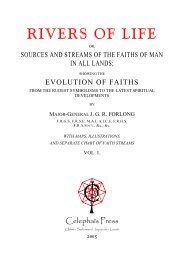You also want an ePaper? Increase the reach of your titles
YUMPU automatically turns print PDFs into web optimized ePapers that Google loves.
120<br />
THE FOURTH DIMENSION<br />
If the order and the law we see is due to the conditions<br />
of conscious experience, we must conceive nature as<br />
spontaneous, free, subject to no predication that we can<br />
devise, but, however apprehended, subject to our logic.<br />
And our logic is simply spatiality in the general sense<br />
—that resultant of a selection of the permanent from the<br />
unpermanent, the ordered from the unordered, by the<br />
means of the group and its underlying duality.<br />
We can predicate nothing about nature, only about the<br />
way in which we can apprehend nature. All that we can<br />
say is that all that which experience gives us will be considered<br />
as spatial, subject to our logic. Thus, in exploring<br />
the facts of geometry from the simplest logical relations<br />
to the properties of space of any number of dimensions,<br />
we are merely observing ourselves, becoming aware of<br />
the conditions under which we must perceive. Do any<br />
phenomena present themselves incapable of explanation<br />
under the assumption of the space we are dealing with,<br />
then we must habituate ourselves to the conception of a<br />
higher space, in order that our logic may be equal to the<br />
task before us.<br />
We gain a repetition of the thought that came before,<br />
experimentally suggested. If the laws of the intellectual<br />
comprehension of nature are those derived from considering<br />
her as absolute chance, subject to no law save<br />
that derived from a process of selection, then, perhaps, the<br />
order of nature requires different faculties from the intellectual<br />
to apprehend it. <strong>The</strong> source and origin of<br />
ideas may have to be sought elsewhere than in reasoning.<br />
<strong>The</strong> total outcome of the critique is to leave the<br />
ordinary man just where he is, justified in his practical<br />
attitude towards nature, liberated from the fetters of his<br />
own mental representations.<br />
<strong>The</strong> truth of a picture lies in its total effect. It is vain<br />
to seek information about the landscape from an examina-






![[PDF] Prolegomena](https://img.yumpu.com/16774951/1/190x245/pdf-prolegomena.jpg?quality=85)









